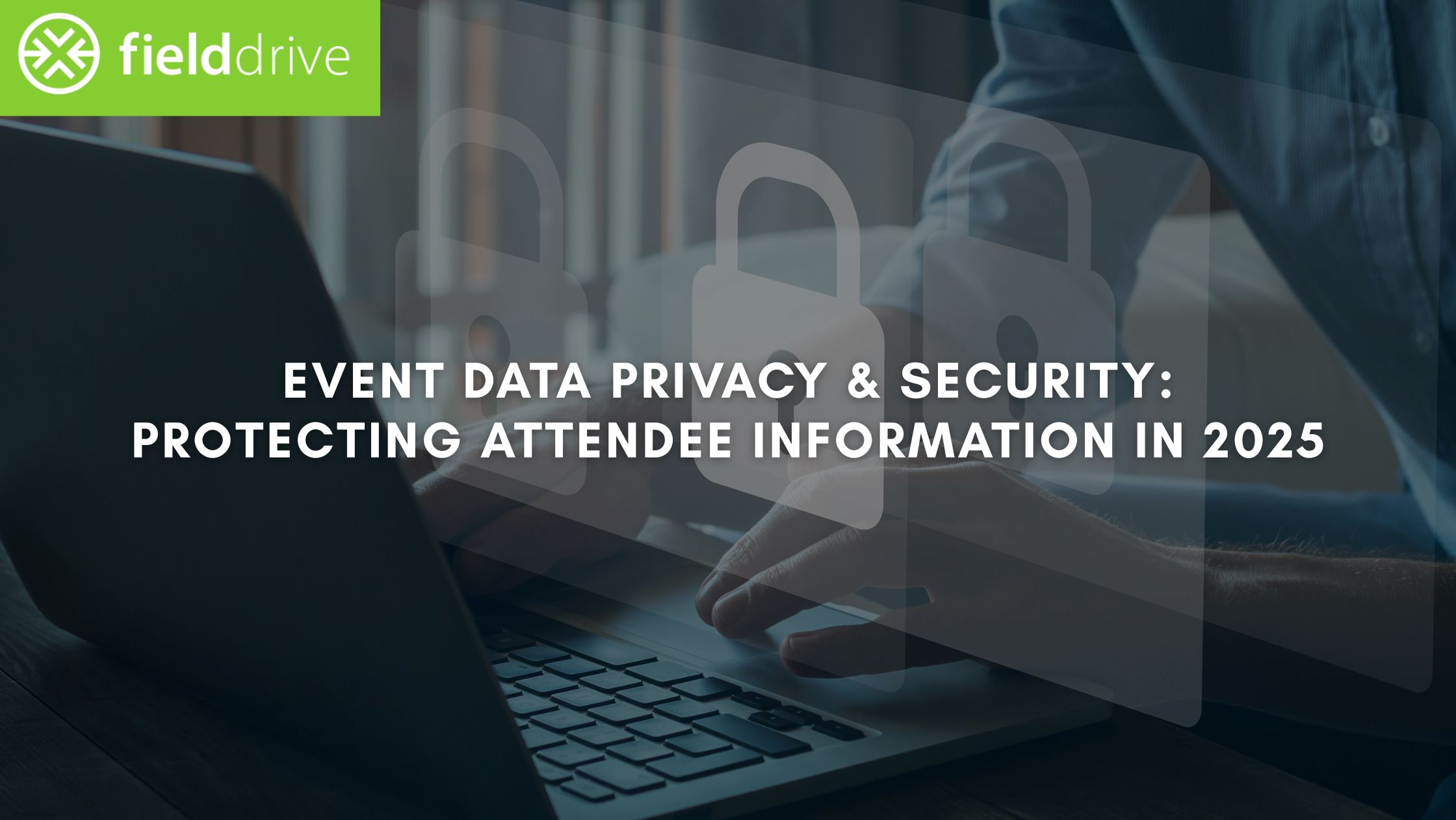Event Data Privacy & Security: Protecting Attendee Information in 2025
Event data is more valuable—and more vulnerable—than ever. With half of UK organizations hit by a data breach in the past year, attendee privacy can no longer be an afterthought. Strong security measures aren’t just about compliance; they’re about protecting trust, reputation, and the success of your events. In this post, we’ll walk through the essential steps event organizers need to safeguard sensitive data in 2025 and beyond.

CONTENT
How secure is your event data? As event technology advances, so does the need to protect your attendee data. In 2025, data privacy concerns are at an all-time high, as 50% of UK organizations experienced a data breach in the past year alone. Event organizers need to have security measures to safeguard sensitive information and ensure compliance with ever-tightening data protection regulations.
In this blog, we’ll explore clear steps for protecting attendee data, understanding legal requirements, and using innovative event technologies to strengthen security.
Key Takeaways:
- Data privacy and security are essential in 2025, especially with increasing breaches and tightening regulations like GDPR.
- Event organizers must understand the types of data collected (personal, sensitive, behavioral) and ensure compliance with data protection laws.
- Key principles for protecting attendee data include transparency, data minimization, accuracy, and accountability.
- Implement strong security measures such as encryption, two-factor authentication, and AI-driven threat detection.
- Develop a breach response plan for swift detection and reporting, including clear communication with affected parties.
Why Data Privacy & Security are Non-Negotiable for Events in 2025
Data privacy and security are crucial in the events industry as more personal information is collected through digital platforms for registration, engagement, and feedback. Research shows that 97% of businesses suffering a cyber attack could have prevented it with modern cybersecurity solutions in place.
This underscores the need for event organisers to have robust security measures. Failing to protect attendee data risks reputational damage and legal penalties.
Compliance with regulations like GDPR is essential for maintaining attendee trust and a positive event experience.
Also Read: 11 Actionable Tips to Improve Event Security and Enhance Safety Protocols
From personal to sensitive data, knowing what you collect is the first step in protecting it. Be clear on the types of data and how they’ll be handled.
Understanding the Types of Attendee Data Collected at Events
Organisers collect a wide range of data to ensure smooth event operations, but knowing exactly what data is being collected is the first step in ensuring its protection. This includes both personal and sensitive data.
1. Personal Data:
- Full name, contact details, job titles, and company affiliations.
- Social media profiles and interactions.
2. Sensitive Data:
- Biometric data (e.g., facial recognition used for check-ins).
- Medical information (e.g., dietary preferences or special accessibility needs).
3. Behavioural Data:
- Session attendance and interaction history.
- Mobile app usage, such as clicks or engagement patterns at virtual events.
Given the diversity of data collected, event organisers need a strategy to handle each type of information differently, ensuring compliance with data protection laws.

Key Principles of Attendee Data Protection
To build trust and stay compliant, event organisers must follow key principles of data protection that are central to regulations like GDPR and others. In fact, only 22% of UK businesses have a formal cybersecurity incident management plan in place, highlighting the need for event organisers to be proactive in safeguarding attendee data.
Here’s how to do it:
- Lawfulness, Fairness, and Transparency: It’s essential to clearly inform attendees about what data is being collected, how it will be used, and how long it will be stored. Transparency is key to building trust.
- Data Minimisation: Only collect the data you actually need to organise and enhance the event. Avoid collecting unnecessary information.
- Accuracy: Ensure the data you collect is accurate and up-to-date. Attendees should also have access to their information and be able to correct any inaccuracies.
- Storage Limitation: Create a data deletion plan to ensure that attendee data is not kept longer than necessary. Once event-related processes are complete, securely delete or anonymise any personal data to prevent unauthorised access.
- Accountability: Keep clear records of all data processing activities. If questioned, you should be able to provide solid evidence of how you’ve complied with data protection laws.

Furthermore, preventive measures like encryption and AI-driven monitoring are key, and having a breach response plan ensures you're ready if things go wrong.
Implementing Effective Security Measures and Breach Response Protocols
Security breaches can undermine all efforts to protect attendee data. Event organisers must put in place effective security measures and develop a breach response plan to act swiftly in case of a security issue.
To protect sensitive data and prevent potential breaches, implement robust security protocols and advanced technologies.
1. Preventive Measures
- Encryption: Protect data both at rest and in transit using strong encryption protocols.
- Two-Factor Authentication (2FA): Implement 2FA for platforms storing sensitive data, such as event registration systems.
- Regular Security Audits: Frequently audit and update security protocols to stay ahead of evolving threats.
- AI-Driven Threat Detection: Utilise AI-based tools and SIEM systems for real-time monitoring of security events, identifying abnormal behaviour, and addressing risks proactively.
- Reputable Payment Gateways: Use secure payment gateways like PayPal or Stripe, which employ SSL/TLS encryption to safeguard financial and personal data during transactions.
2. Breach Response
Establish a clear plan for swiftly detecting, reporting, and addressing data breaches to minimise impact and comply with legal requirements.
- Breach Detection & Reporting: Develop a clear protocol for detecting breaches and ensure timely reporting to the Information Commissioner’s Office (ICO) within 72 hours if it affects data subjects.
- Disaster Recovery Plan: Create a plan outlining how to notify customers about breaches, protect their data, and maintain transparency, in compliance with GDPR requirements.

Data sharing with vendors? Make sure you have solid agreements and regular audits to keep data secure and compliant with regulations.
Managing Third-Party Data Sharing and Compliance
Sharing attendee data with third-party vendors, such as event platforms or sponsors, is standard practice but requires strict oversight to ensure compliance with data protection regulations.
1. Third-Party Agreements
Contracts must include specific clauses outlining how data will be processed, stored, and securely deleted.
These agreements should mandate the use of encryption, firewalls, access control mechanisms, and anonymisation to ensure GDPR compliance.
2. Vendor Audits
Regular security audits of third-party vendors are necessary to assess their encryption standards, firewalls, access management, and adherence to data handling protocols. Audits ensure that vendors meet the same security benchmarks required by GDPR.
3. Processor Compliance
Under UK GDPR, third-party data processors must implement the same technical and organisational security measures as the primary organisation.
This includes secure data transfer methods, data access controls, and ensuring data integrity.
How to Use Innovative Solutions that Strengthen Data Privacy
Advances in event technology offer powerful tools to enhance data privacy while improving the attendee experience.
By integrating GDPR-compliant solutions, event organisers can ensure compliance with data protection laws and streamline operations.
1. GDPR-Compliant Technology Tools
Utilising GDPR-compliant technologies ensures secure data collection, storage, and management, reducing the risk of breaches.
Tools that incorporate encryption and anonymisation, such as those provided by fielddrive, help protect sensitive attendee data and maintain compliance with data protection regulations.
2. Secure Registration and Badging Methods
Implementing secure, contactless registration and badging systems, such as facial recognition, minimises the handling of physical documents and prevents unauthorised access.
3. Secure Data Reporting Systems
Secure reporting systems are essential for analysing attendee behaviour and engagement while safeguarding personal data.
These systems ensure encrypted data storage and prevent the exposure of sensitive information, enabling organisers to gain valuable insights while maintaining the highest security standards.
Also Read: Expert Tips On How To Find Your Perfect Event Registration Platform
Conclusion
Protecting attendee data is a core responsibility for event organisers, directly impacting both compliance and attendee trust. By following GDPR guidelines and implementing strong security measures, organisers can ensure data privacy while streamlining event processes.
Tools like encryption, anonymisation, and secure registration systems minimise risks and safeguard sensitive information.
fielddrive’s event technology platform offers a seamless way to handle data securely while improving operational efficiency. With features like secure check-ins, facial recognition, and real-time analytics, fielddrive ensures both event security and smooth attendee experiences.

Ready to secure your event and simplify operations? Book a demo today to learn how our solutions can enhance your event while keeping attendee data safe.
FAQs
Q: How often should event organisers update their data protection policies?
A: Event organisers should review and update their data protection policies at least annually, or whenever there are significant changes in regulations, technology, or the type of data collected.
Q: How can event organisers ensure compliance with GDPR when hosting virtual events?
A: Organisers should choose virtual platforms that are GDPR-compliant, ensure all data is encrypted, and provide clear instructions for attendees on how their data will be used and protected.
Q: What are the best practices for storing sensitive attendee data during an event?
A: Sensitive attendee data should be stored in encrypted systems, with restricted access only for authorised personnel. Ensure data is retained only as long as necessary and securely deleted when no longer needed.
Q: Can event organisers use attendee data for marketing purposes?
A: Attendee data can only be used for marketing if explicit consent is obtained during registration. It’s essential to offer opt-in and opt-out options and comply with data protection laws regarding marketing communications.
Q: How can event organisers mitigate the risk of data breaches during the event?
A: Event organisers can minimise breach risks by using secure registration systems, implementing two-factor authentication, conducting regular security audits, and ensuring all sensitive data is encrypted and stored securely.
Want to learn how fielddrive can help you elevate your events?
Book a call with our experts today



.png)
.svg)
.svg)
.svg)

.svg)